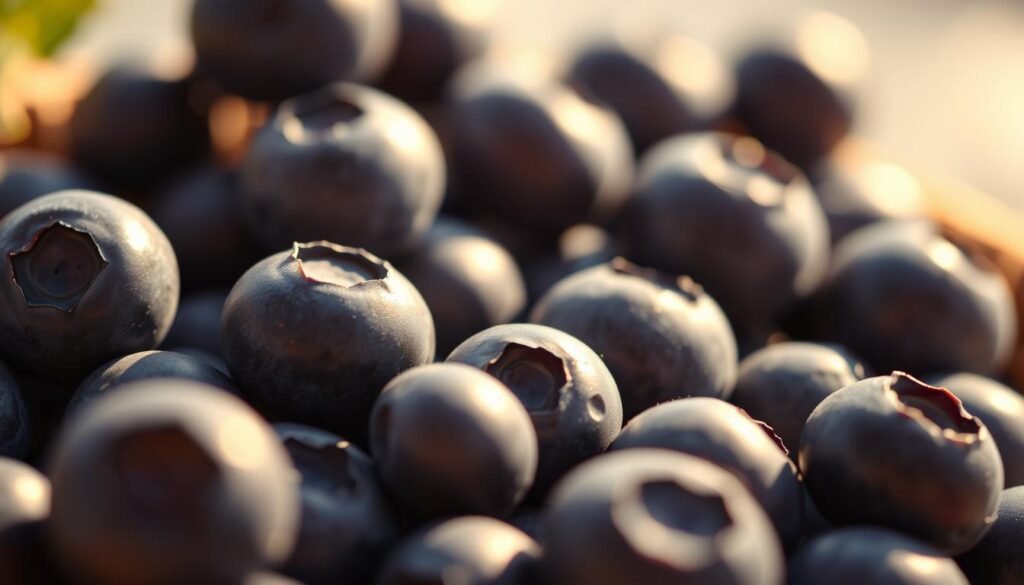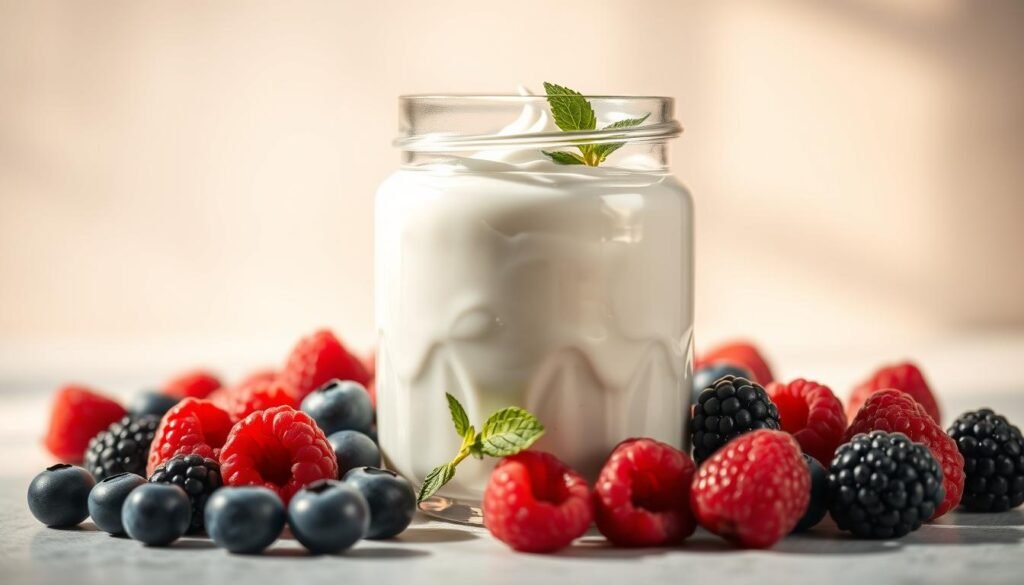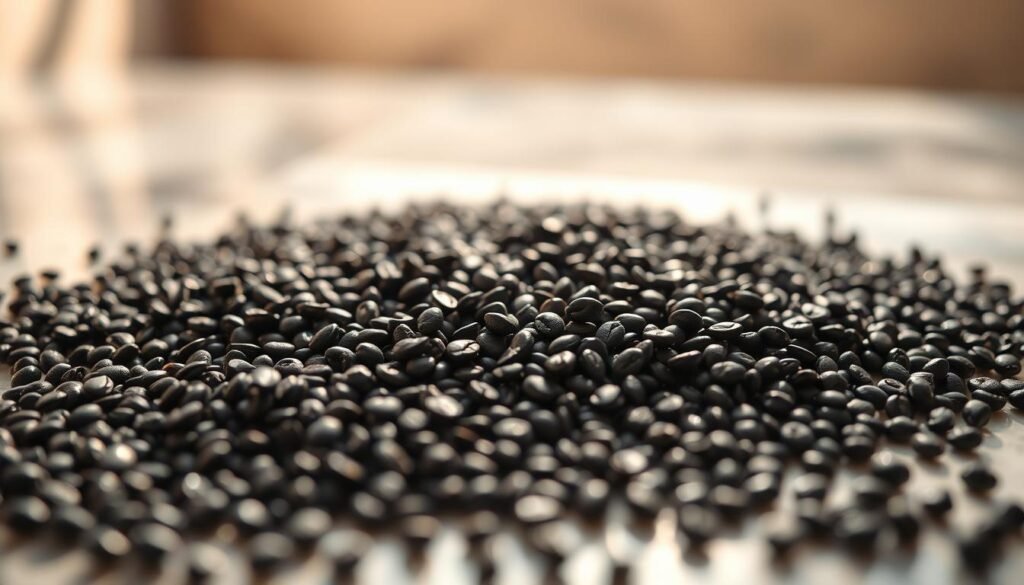We think good health comes from eating a variety of nutritious foods every day. Focusing on nutrition & healthy eating is key. Adding some or all of these foods to our diet can boost our health and prevent diseases. Planning our meals well is important to get the most from our food.
When choosing our daily foods, it’s crucial to pick nutrient-rich options. The « What’s Trending in Nutrition » survey consulted 564 registered dietitians. This helps us make better choices for our nutrition & healthy eating habits. By focusing on a balanced diet, we can start living healthier.
Making small changes to our meal planning can bring big benefits. Whether we want to improve our health or prevent diseases, a diet full of superfoods is a great start. With the right mix of nutrition & healthy eating, we can reach our health goals and feel great.
Key Takeaways
- Eating a variety of nutritious foods daily supports good health and prevents chronic diseases
- A balanced diet with meal planning is crucial for overall well-being
- Nutrition & healthy eating habits can be improved with the help of registered dietitians
- Incorporating superfoods into our daily meals can have numerous health benefits
- A well-planned balanced diet is essential for achieving our health goals
Understanding Superfoods: Nature’s Nutritional Powerhouses
Many of us wonder what makes a food « super ». The term « superfood » was created for marketing. It has influenced food trends and sales. Yet, many foods could be called super. It’s key to know that no single food guarantees health or prevents disease.
By choosing clean eating and adding nutrient-rich foods to our meals, we can enjoy their benefits. This approach focuses on whole, unprocessed foods.
Superfoods are packed with nutrients, offering more benefits per calorie than regular foods. They’re great for a mindful eating lifestyle. Dark green leafy veggies, berries, and nuts are examples. They’re full of antioxidants and other vital nutrients.
Eating a variety of superfoods can boost energy, improve skin, and help with weight control. Berries, like strawberries and raspberries, are high in antioxidants. They support the immune system. A diet rich in superfoods can fight oxidative stress, which helps prevent aging and diseases.
- Reduced risk of chronic illnesses, such as heart disease and type 2 diabetes
- High antioxidant capacity, associated with a reduced risk of heart disease, cancer, and other inflammatory conditions
- Potential weight loss benefits, particularly when combined with a balanced diet and regular exercise
By prioritizing clean eating and mindful eating, and adding nutrient-rich foods to our meals, we can enjoy superfoods’ benefits. This improves our health and wellbeing.
Blueberries: The Brain-Boosting Berry
We’re excited to explore blueberries, a nutritional powerhouse. They are full of vitamins, minerals, fiber, and antioxidants. To get the most from blueberries, portion control is crucial. Eating 75–80 blueberries daily can boost brain and heart health, making them great for healthy recipes.
Blueberries offer many benefits:
- Improved brain function and memory
- Reduced risk of heart disease and cancer
- High antioxidant capacity
- Potential to alleviate behavioral deficits in ageing animals
Research shows that 26 grams of freeze-dried wild blueberry powder daily can lower blood pressure and enhance brain function. We can add blueberries to oatmeal or yogurt, or enjoy them as juice or supplements. Their health benefits and versatility in healthy recipes make them a « superfruit » or « superfood ».

To maximize blueberries’ benefits, it’s key to practice portion control and eat them as part of a balanced diet. With their high antioxidant levels and disease-fighting potential, blueberries are a fantastic addition to our meals. By adding blueberries to our healthy recipes, we can significantly improve our health and wellbeing.
Salmon: Essential Omega-3 Superfood
Salmon is a great choice for a balanced diet. It’s packed with omega-3s, which are good for your heart. Eating salmon often can help your heart work better, lower blood pressure, and fight inflammation.
A three-ounce serving of salmon gives you about 14% of your daily calorie needs. Wild salmon is more nutritious than farmed salmon. Salmon also has potassium, which helps keep your blood pressure in check and prevents fluid buildup.
Eating salmon regularly can lower your risk of heart problems like heart attacks and strokes. It also helps with blood pressure. Plus, omega-3s in salmon boost brain function and help with ADHD symptoms in kids.
To add salmon to your meals, try these ideas:
- Grill or bake salmon for a healthy and flavorful dinner
- Add smoked salmon to your breakfast bagel or omelette
- Use canned salmon to make a quick and easy salad
By following these dietary guidelines and adding salmon to your balanced diet, you’ll enjoy many health benefits.
Leafy Greens: The Foundation of Nutrition & Healthy Eating
Leafy greens are a top pick for clean eating. They’re full of nutrients like folate, zinc, and vitamins C and K. Dark greens, like romaine, have more vitamin A than iceberg lettuce, making them a great meal planning choice.
Leafy greens offer many benefits:
- They contain anti-inflammatory compounds called carotenoids, which may fight cancer
- They’re rich in beta carotene, which turns into vitamin A
- They have folate, potassium, and fiber, plus vitamins and minerals for health
Adding a bit of fat helps your body absorb nutrients from leafy greens better. Cooking them can make them smaller by about 50%. This shows how important it is to plan your portions. Leafy greens can also boost the nutrition of soups, stews, and casseroles, making them a key part of meal planning for clean eating.

Popular leafy greens include spinach, kale, collard greens, and romaine lettuce. They’re low in calories, which helps with weight management. They’re also full of vitamins and minerals, making them a healthy addition to your diet. Adding leafy greens to your meal planning can improve your health and make clean eating a lifestyle choice.
| Leafy Green | Nutritional Benefits |
|---|---|
| Spinach | High levels of iron, calcium, potassium, and vitamins B6, C, and K |
| Kale | Rich in vitamins A, C, and K, and minerals like calcium and iron |
| Collard Greens | Good source of vitamins A, C, and K, and minerals like calcium and iron |
Quinoa: Complete Protein Powerhouse
Quinoa is a food packed with nutrients, making it great for mindful eating. It’s a complete protein, meaning it has all nine essential amino acids. You get about 8 grams of protein per cup of cooked quinoa.
Quinoa’s high protein value is similar to beef, at 73%. This makes it a top choice for boosting protein in your diet. Plus, it’s rich in dietary fiber, with about 5 grams per cup of cooked quinoa.
To add quinoa to your meals, try these ideas:
- Use quinoa as a base for salads
- Add quinoa to soups and stews for extra protein and fiber
- Replace rice or brown rice with quinoa as a side dish
https://www.youtube.com/watch?v=AlSvyLG1etI&pp=ygUPI3ZlcnNhdGlsZWJvd2xz
Adding quinoa to your diet brings the benefits of mindful eating. It’s a food that’s good for your health and well-being.
| Nutrient | Amount per cup of cooked quinoa |
|---|---|
| Protein | 8 grams |
| Fiber | 5 grams |
| Carbohydrates | 39 grams |
Greek Yogurt: Probiotic Paradise
We seek foods that taste great and are good for us. Greek yogurt is a top choice, packed with protein, calcium, and probiotics. These help our digestion. It’s easy to add Greek yogurt to our meals, like in smoothies or on oatmeal.
Looking at dietary guidelines, Greek yogurt has almost twice as much protein as regular yogurt. It’s perfect for boosting protein in our diet. Its high protein and digestive benefits make it a great daily addition.
Here are some ways to add Greek yogurt to our diet:
- Use it as a base for smoothies
- Add it as a topping for oatmeal or parfaits
- Use it as a substitute for higher-calorie dressings or spreads
Greek yogurt is full of health benefits and is easy to use in healthy recipes. It’s a great choice for improving our health and following dietary guidelines.

Chia Seeds: Tiny Seeds, Mighty Benefits
Chia seeds are packed with nutrients and can be added to our meals easily. They are full of fiber, protein, and omega-3 fatty acids. This makes them a great choice for a healthy diet. Start by adding a small amount to oatmeal or yogurt to practice portion control.
Chia seeds are high in fiber, which helps us feel full longer. This supports mindful eating. Here are some ways to add chia seeds to your diet:
- Adding them to oatmeal or yogurt for breakfast
- Using them as an egg substitute in baking
- Mixing them with water to create a pudding-like texture
Chia seeds can be used in many dishes, from salads to smoothies. They have a mild taste and can soak up a lot of liquid. This makes them very versatile.

Adding chia seeds to our diet can bring many health benefits. It can help reduce inflammation and improve heart health. By controlling portions and eating mindfully, we can enjoy the benefits of chia seeds and keep our diet balanced.
| Nutrient | Amount per 1 ounce (28g) |
|---|---|
| Calories | 138 |
| Protein | 4.7g |
| Fiber | 9.8g |
| Omega-3 fatty acids | 5g |
Sweet Potatoes: Vitamin-Rich Carbohydrates
Sweet potatoes are often overlooked as a balanced diet staple. But they are full of vitamins, minerals, and antioxidants. One medium sweet potato has lots of vitamin A, vitamin C, and manganese. This makes them a great choice for our daily meal planning.
Sweet potatoes are also high in fiber, with about 6.6 grams per 200 grams. Eating foods high in fiber can help our digestion and lower colon cancer risk. They also have a lot of water, about 77%, which helps us feel full and can aid in weight management.
Some key benefits of sweet potatoes include:
- High in vitamin A, important for healthy vision and immune function
- Rich in antioxidants, protecting cells and reducing disease risk
- Good source of fiber, supporting healthy digestion and bowel function
- Low on the glycemic index, good for those with diabetes or blood sugar management
Incorporating sweet potatoes into our meal planning is easy. We can bake, roast, or boil them. They’re versatile and can be used in many dishes, from savory meals to sweet desserts. Sweet potatoes are a great addition to a balanced diet.
By adding sweet potatoes to our diet, we get their nutritional benefits. They help us have a healthier, more balanced diet. So, let’s include them in our meals next time we plan.
Almonds: Heart-Healthy Snacking
Looking for snacks that taste good and are good for you? Almonds are a top pick. They’re full of healthy fats, protein, and fiber. This makes them perfect for keeping your heart healthy. It’s key to eat them in the right amounts to get the most benefits.
Almonds can boost your meals like oatmeal or yogurt. They’re also great on salads or as a snack on their own. Adding almonds to your diet helps support your health and well-being.
Here are some ways to add almonds to your meals:
- Add sliced almonds to oatmeal or yogurt for a nutritious breakfast
- Use almond butter as a spread for whole-grain toast or as an ingredient in healthy recipes
- Top salads with sliced almonds for a crunchy and nutritious snack
Making small changes to your diet, like adding almonds, can greatly improve your health. Almonds are packed with nutrients and can be used in many healthy recipes. They’re a great choice for a heart-healthy diet.
| Nutrient | Amount per ounce |
|---|---|
| Calories | 160 |
| Protein | 6 grams |
| Fiber | 4 grams |
| Monounsaturated fats | 9 grams |
Conclusion: Transforming Your Health Through Superfood Integration
Incorporating superfoods into our daily meals can greatly improve our health. These foods are full of vitamins, minerals, and antioxidants. They help us stay well, lower disease risks, and boost our energy.
Small changes in our diet can make a big difference. Adding foods like blueberries, salmon, leafy greens, and almonds can help us live healthier. It’s important to do this slowly and consistently. This way, we can enjoy lasting benefits in our eating habits.
Before changing our diet, it’s smart to talk to a healthcare professional. They can give advice that fits our specific needs and goals. With their help and our dedication to eating superfoods, we can truly improve our health.

